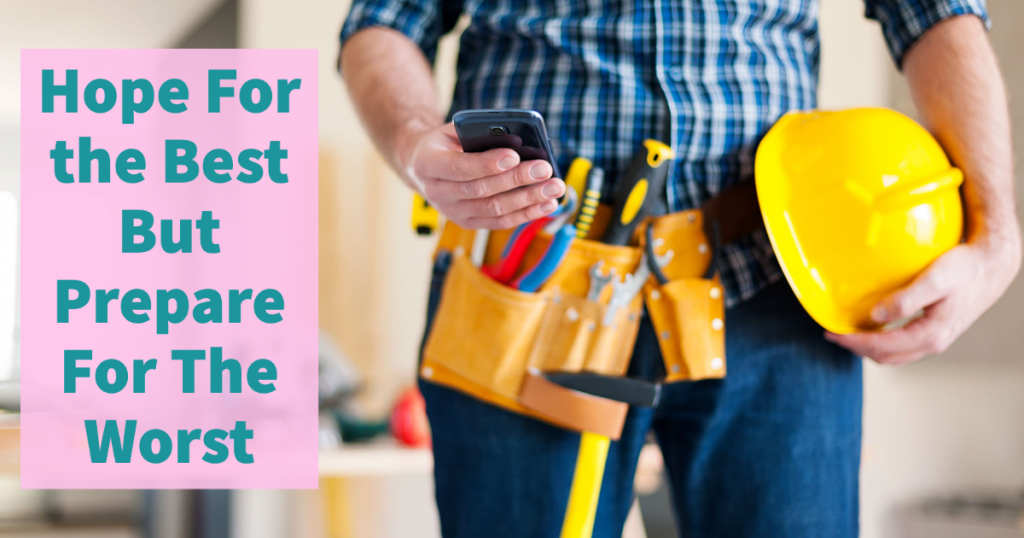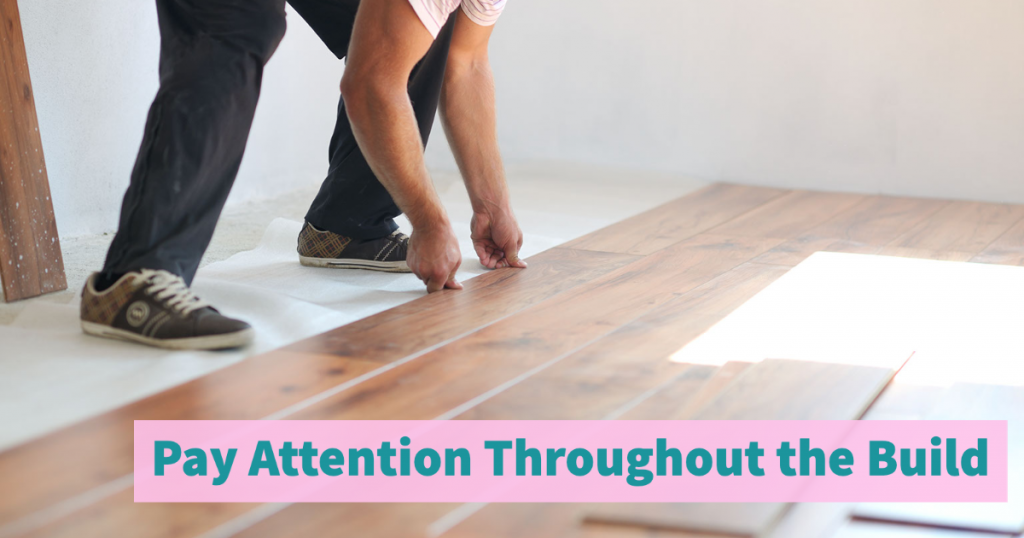What You Should Know When You Build Your New Home

When you are getting ready to build your new home, you likely have many questions. There are a lot of things to plan for when you build your new home and a lot of questions that crop up along the way.
Every expert will agree that one of the best ways to have a smooth build is to plan thoroughly for every stage. Planning is the key to a stress-free build.
Start Planning Early On
A lot of people are making the decision when they are building a home to do part of the work themselves. They work with a custom home builder who does the brunt of the work and they make arrangements to take on some of their work on their own to save some money.
A good example of this co-working arrangement is all the major construction is left up to the contractor while much of the finish work is left up to the homeowner. For example, septic installations are typically managed by a contractor, while landscaping and interior finish work is managed by the homeowner.
Why do people decide that this is the best of both worlds? It can all be summed up in one word: savings. You can save a boatload of money when you build your new home if you are willing to put in some sweat equity.
It can really feel overwhelming when you build your new home and have decided to do some of the work yourself, but you can overcome those feelings by having a plan. Making a master list of all the things that have to be done to get you to homeownership is the best way to ensure that nothing is overlooked.
Making a master list, then keeping sub-lists as you move through the process, and frequently comparing the two will help to keep you on track. Of course, having a handy list also will help you to plan one step ahead throughout the project.
Your master list should be the list that includes all the supplies, equipment, rentals, and services that you will need to help the project come together. You want to include all the major costs like hydraulic services and all the minor costs like trim molding for the dining room.
It is important that your master list is all-encompassing. It will help you to estimate your costs more effectively, and ensure that the project keeps moving forward in a positive direction. A master list can also help you save time and money.
For example, on your list you may have a forklift rental to help move supplies. You will also need other materials for your project that you will need a forklift for, even if you are not necessarily up to that part of the project. Reviewing your master list often to see how you can get double duty out of your rentals can help to save you money.
Hope For the Best But Prepare For The Worst

One of the reasons new homeowners find that their build did not go the way they plan is because they did not adequately plan for “in case of”. There are a lot of things that can crop up when you build your new home that is outside your control and your builder’s control. This can mean delays.
Weather is a big delayer when it comes to building a home. When you build your new home you want to plan for potential delays. For example, if you are currently renting, make sure your lease goes at least two months beyond the point that the end date of the build is projected. You do not want to leave yourself homeless because of weather delays.
You want to overestimate when it comes to costs as well. If you overestimate on costs, then you will have a nice cushion if the cost comes in less than you planned. Of course, if you overestimate costs and things do get more expensive, you will be prepared.
There are a lot of working parts that are needed when you build your new home. Weather is not the only thing that can crop up that may slow down the process.
A very common reason for a project delay is waiting on service providers. The more custom your home is planned to be, the more likely you will run into a service provider delay. For example, if you plan on adding an elevator, there are not a lot of elevator companies and you may have to wait until the elevator company can provide the service. Other common reasons for project delays include financing problems and unexpected life events.
When you build your new home, the key is always to plan ahead but sometimes that plan can go a little bit of track. Whether it is waiting for subcontractors to be able to provide you with a service or you have an unexpected life event that puts the brakes on the project, if you have planned for the worst, you will be ready.
When Money Starts Getting Tight

While you build your new home, life goes on, which means that there will be financial hiccups along the way. For example, you could be getting ready to pay pavers for that patio that you are building as your part of the project, but an unexpected cost comes up.
You were not expecting your daughter to need braces just yet, but the orthodontist strongly recommends them. Do you deny your daughter a great smile? Of course not. You put the pavers on hold till next month or the month after.
Situations like this are why it is so important to have a flexible plan in place that addresses all the necessities first. If you have your master list and are following it, all the big jobs will have been paid for. Certain things may have to be put on hold so you can address the unexpected costs that come up.
Pay Attention Throughout the Build

If you are not fond of surprises when it comes to your new home, you have to stay engaged. A lot of homeowners never visit the building site. They will stop by when the foundation is poured and may pass through once in a while after but they do not stay connected to the builder other than to ask when the house will be ready.
It is important that you stay engaged throughout the process. There is nothing wrong with showing up and inspecting how the work is going and doing it regularly. It is your home that you are paying for and you can check on it when you want to.
A lot of people put a lot more effort into choosing the perfect engagement rings than they do into building their home. You have to be involved. It is actually easier on the builder if you are involved every step of the way.
Let’s say that there was a miscommunication (which often happens) between you and the builder about the kitchen cabinets. It is far easier for everyone involved if you happen by on the day the cabinets are getting ready to be installed, instead of doing the final walk-through and realizing that the cabinets are wrong.
Errors can quickly be corrected while you are in the middle of the build. They are not likely going to be corrected once the build is done. You can save yourself some disappointment by staying involved in the build.
Let’s Chat About Communication

When you build your new home, you want to be sure that you keep open lines of communication with your general contractor, any suppliers, any equipment rental places, and anyone else that has anything to do with the build.
Open communication and being able to advocate for yourself is vital to the process. It can help you to save time, money, and a lot of stress. If you feel like something is not being done right, you have to speak up. You have to be able to convey your wants clearly and concisely when you build your new home.
These tips can help you to keep those communication lines open:
- Be responsive
- Write down all your questions as they pop up
- Ask contractors for weekly updates
Remember that you are responsible for half of the communication responsibilities. That means when you get an email, call, or text, answer promptly. For example, if you ordered new air compressors and the company has a question, and they text or email, you have to respond quickly or they may just move forward with the order which may not be right for you.
Writing down questions to ask builders, contractors, and suppliers when you think of them is a really good idea. You have a lot to think about when you build your new home, and it can be really easy to get sidetracked and forget the question. If you take a minute to write the question down you will have all your questions ready when you speak to the person.
Treat building your home like managing your team at work. Request that there is a weekly meeting of the minds where updates can be shared, problems can be presented, and potential solutions can be kicked around. A weekly conference call or in-person meeting can help to make sure everyone is on the same page and every part of the team knows what the other team members are up to.
The weekly meeting does not have to be a long drawn out affair, it can be as simple as a ten-minute call where all the people involved with the build check-in and give a progress update. This type of meeting can help to avert scheduling conflicts and other delays. Of course, it will also keep you in the loop and abreast of any obstacles that need to be circumvented.
Follow up those phone calls with an email that outlines what was discussed. Whenever you get a contractor’s “word” or a promise from them, tell them to put it in writing. This protects both you and them.
The End Zone
Once you get in view of the end zone, you still have some work to do, especially if you are doing the finish work yourself. You still have some expenses ahead of you. When you are at the end of the build, it is a great time to start arranging for maintenance contracts for all the major systems in your home.
A lot of homeowners skip things like hot water heater maintenance agreements or HVAC agreements because they figure everything is brand new and under warranty. The best way to keep all your brand new systems in top condition is to pay for those maintenance agreements. A little maintenance can go a long way in ensuring that all your household systems last for years and years without any issue.
You will not need any maintenance for the first year you are in the home, but you will need it next year. Making those arrangements now while your equipment is in a brand new state will be less costly and ultimately will ensure your new systems stay in great condition.
Many times the contractor that installed the system will offer a maintenance plan. Ask about a maintenance plan and the cost. It is a decision that you will never regret.
Other things you need to do at the end of the build:
- Take your final walkthrough very seriously
- Address any problems that you see
- Ask plenty of questions
You will have a final walk through with the builder. This is a very important part of the process. You want to make sure that you make note of any issues that you see. If there are problems like something that was promised (hopefully you got it in writing) that is not installed, point it out immediately. If you notice any cracks or incomplete finishes, point them out immediately.
Most builders are good about making corrections, but you still have to protect your investment. That means do not schedule the final closing or transfer until the corrections have been made. Yes, it can be frustrating when you are ready to move in and you have to wait a little longer, but in the end it is best not to accept something that is not up to par.
